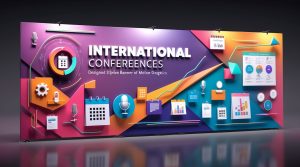Artificial Intelligence (AI) and Machine Learning (ML) are no longer buzzwords — they are transforming how professionals learn, collaborate, and innovate. As the global AI market is projected to reach $1.8 trillion by 2030, computer science engineering conferences have become prime hubs where this transformation unfolds. These events now serve not only as meeting grounds for researchers and industry leaders but also as platforms where AI and ML shape decision-making, content delivery, and future technological advancements.
Computer science engineering conferences are evolving rapidly, and AI is at the center of this change. From AI-powered scheduling systems to ML-enhanced research dissemination, these technologies are redefining how conferences are organized and how professionals interact.
How AI and ML Are Transforming Conference Planning & Organization
AI and ML have revolutionized the way computer science conferences are organized—from behind-the-scenes planning to real-time event management.
1. AI-Driven Event Scheduling
AI tools analyze attendee interests, speaker availability, and room capacities to create optimized schedules.
Benefits include:
- Reduced scheduling conflicts
- Personalized agenda suggestions
- Maximized session engagement
2. Smart Registration and Check-In
Machine learning algorithms streamline registration workflows using:
- Facial recognition for fast check-ins
- Predictive analytics to forecast attendee turnout
- Automated badge creation
These features help organizers reduce wait times and improve overall attendee experience.
3. Enhanced Event Security
AI systems strengthen event security through:
- Real-time anomaly detection
- Crowd behavior monitoring
- Automated threat alerts
This creates safer environments for professionals and researchers.
AI and ML in Research Presentation and Knowledge Sharing
1. Automated Research Categorization
ML models classify submitted research papers into accurate categories, improving peer-review workflows and reducing manual screening.
2. Smarter Peer-Review Processes
AI assists in:
- Detecting plagiarism
- Identifying potential data manipulation
- Matching manuscripts with qualified reviewers
This results in more transparent and reliable research quality checks.
3. AI-Powered Presentation Tools
Speakers use tools like GPT-based assistants to generate:
- Data-rich presentations
- Automated summaries
- Transcripts and real-time translations
This technology improves accessibility and ensures impactful presentations for global audiences.
Enhancing Networking Opportunities Through AI
Networking is one of the most valuable aspects of attending conferences. AI and ML make it easier, smarter, and more meaningful.
1. Smart Matchmaking
AI recommends connections based on:
- Research interests
- Past conference activity
- Academic or industry specialization
This helps attendees meet relevant experts, collaborators, and potential employers.
2. Virtual Assistants and Chatbots
AI chatbots help attendees:
- Navigate venues
- Find specific sessions
- Connect with peers
- Schedule meetings
These features improve attendee satisfaction and engagement.
3. Predictive Analytics for Networking Trends
ML tools analyze communication patterns to identify trending topics, emerging subfields, and influential researchers.
The Future of Computer Science Engineering Conferences with AI
The next generation of conferences will be more immersive, interactive, and data-driven.
1. AI-Driven Virtual and Hybrid Conferences
AI enhances virtual conferences through:
- Adaptive streaming quality
- Personalized content recommendations
- AI-powered Q&A moderation
- Automated session insights
This ensures high-quality participation regardless of geographical barriers.
2. Digital Twins of Conference Environments
Using ML and simulation models, event organizers can test:
- Crowd flow
- Booth arrangements
- Emergency evacuation plans
This leads to better planning and safer execution.
3. Advanced Sentiment and Feedback Analysis
AI evaluates attendee feedback in real time using NLP techniques. Conferences can immediately:
- Adjust session lengths
- Improve technical setups
- Add new trending topics
This creates responsive, attendee-centric events.
Impact of AI and ML on Research Visibility and Career Growth
1. Personalized Research Recommendations
Attendees receive AI-curated research papers, sessions, and workshops based on their interests and interactions.
2. Increased Opportunities for Early-Career Researchers
AI platforms surface lesser-known authors and highlight rising research trends, helping early-stage professionals gain visibility.
3. AI Tools for Skill Development
Workshops integrate AI tools that help professionals learn:
- Coding
- Data analysis
- Research automation
- Visualization
This enriches both academic and industry careers.
FAQs: Role of AI and Machine Learning in Computer Science Engineering Conferences
1. How is AI improving conference organization?
AI optimizes scheduling, automates check-ins, enhances security, and improves attendee management through predictive analytics.
2. What role does ML play in peer review?
Machine learning streamlines research categorization, detects plagiarism, and matches papers with expert reviewers to ensure fairness.
3. Can AI enhance networking at conferences?
Yes. AI-driven matchmaking and smart assistants help attendees find the right people, schedule meetings, and discover collaboration opportunities.
4. Are virtual conferences better with AI?
AI improves virtual experiences by providing adaptive streaming, personalized recommendations, automated translations, and engagement insights.
5. How does AI help presenters?
AI tools generate presentation content, automate summaries, and offer real-time language translation, making presentations clearer and more accessible.
6. What future trends will AI bring to engineering conferences?
Expect digital twins, real-time sentiment analysis, AI moderation, and deeply personalized attendee experiences.
7. Is AI useful for early-career professionals?
Absolutely. AI platforms increase research visibility, suggest curated learning paths, and recommend career-enhancing connections.
Conclusion
AI and machine learning are transforming every aspect of computer science engineering conferences—from planning and presentation to networking and research visibility. These technologies not only enhance attendee experience but also elevate the global impact of research and collaboration. As conferences continue to grow more data-driven and intelligent, professionals who embrace AI-powered tools will stay ahead in the rapidly evolving tech world.
Ready to explore upcoming conferences shaped by AI innovation?
👉 Join now at Conferences Daily















